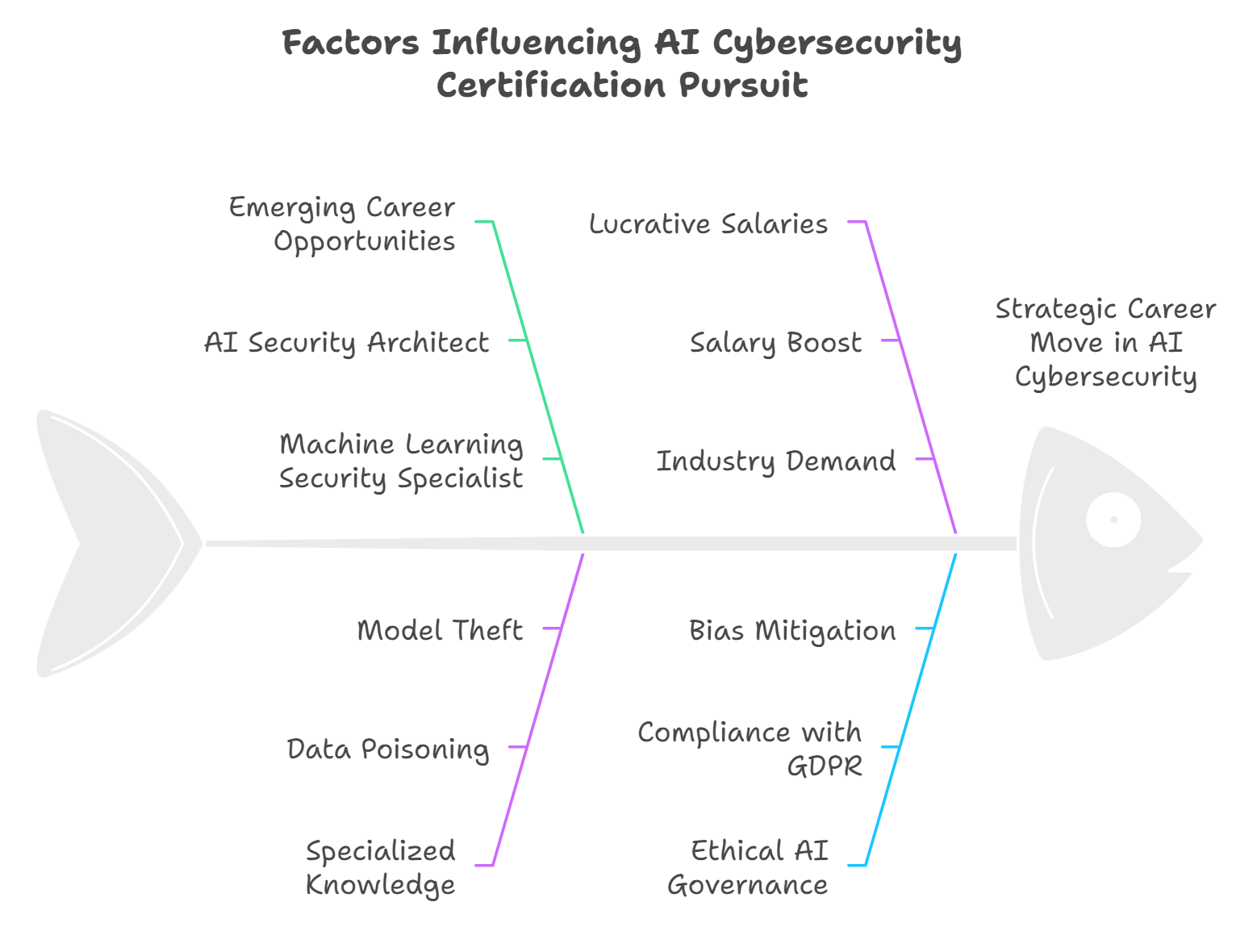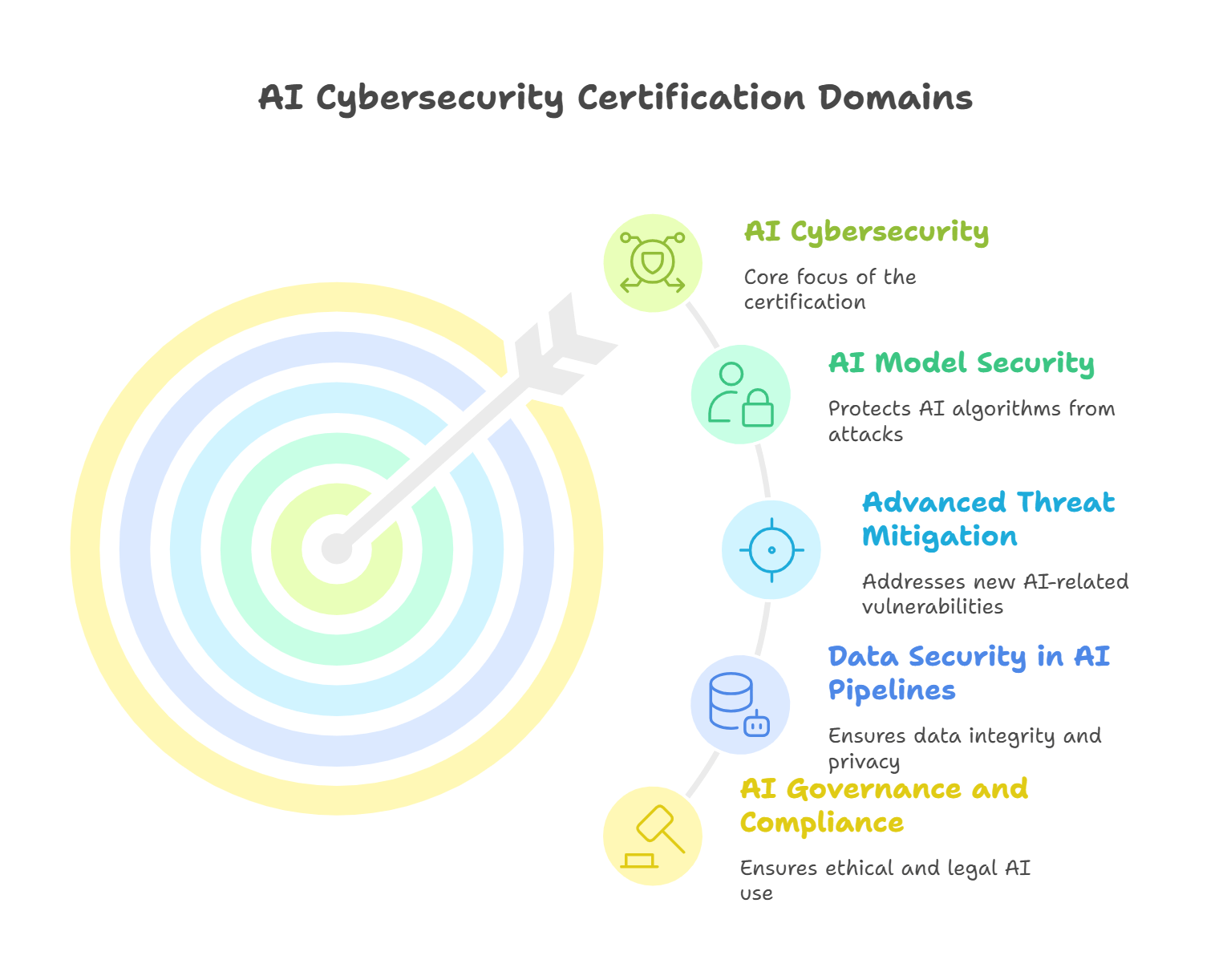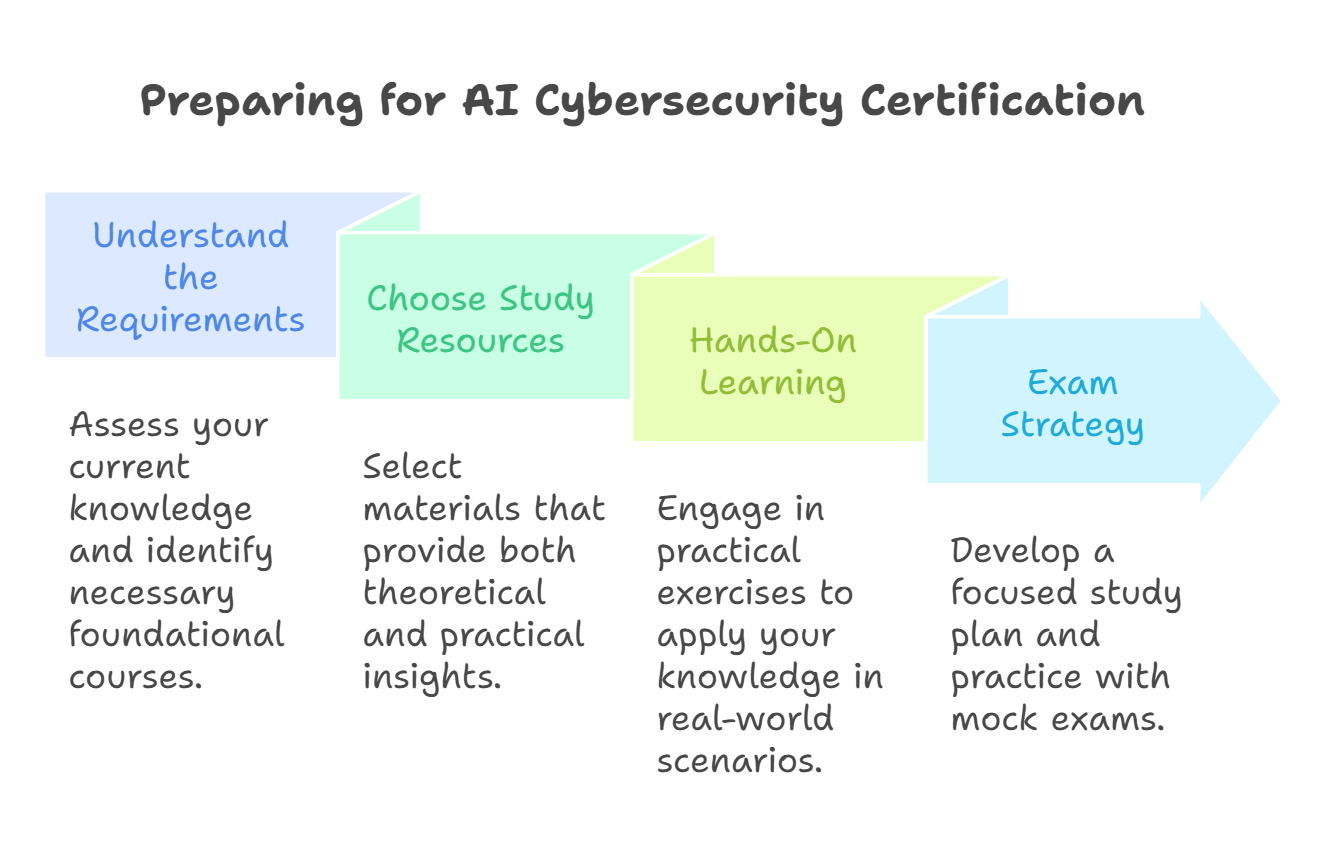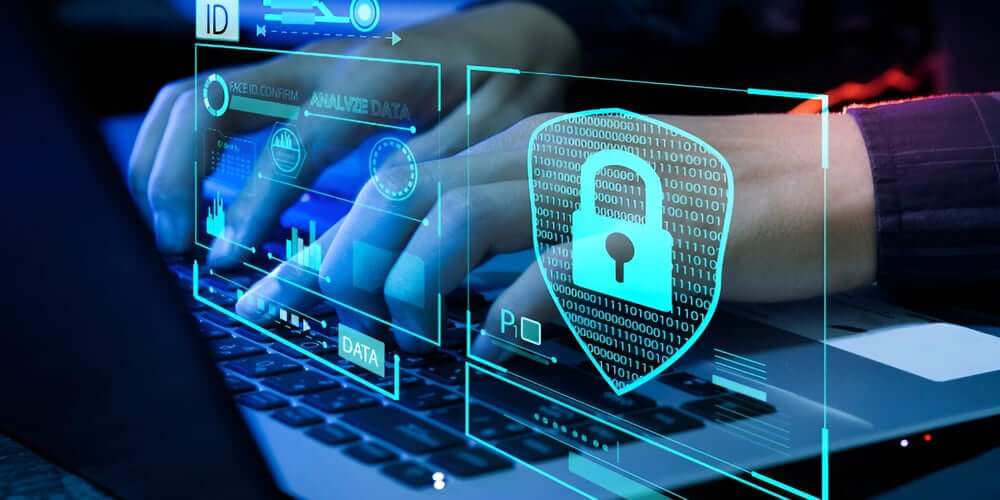Table of Contents
- Why Pursue an AI Cybersecurity Certification?
- 1. Emerging Career Opportunities
- 2. Specialized Knowledge
- 3. Lucrative Salaries
- 4. Stay Ahead of Cyber Threats
- 5. Ethical AI Governance
- Key Domains Covered in AI Cybersecurity Certification
- How to Prepare for AI Cybersecurity Certification
- Top Benefits of AI Cybersecurity Certification
- Final Thoughts
- FAQ Section
The AI Cybersecurity Certification is a specialized credential designed to equip professionals with the necessary skills and knowledge to secure AI-driven systems, data, and practices. As artificial intelligence (AI) technologies continue to integrate into critical sectors such as healthcare, finance, national security, and autonomous systems, the need to safeguard these applications against cyber threats becomes more pressing. AI systems, while powerful and transformative, come with unique security challenges that traditional cybersecurity practices may not address. Understanding What is a Cybersecurity Certification Pathway helps professionals navigate the steps required to build expertise in this evolving field.
This certification focuses on securing AI-driven applications and mitigating AI-related threats, including adversarial attacks, data poisoning, model theft, and algorithmic manipulation. These vulnerabilities are often complex, as AI systems evolve and learn, creating new opportunities for exploitation by cybercriminals. The AI Cybersecurity Certification provides professionals with the tools to understand and address the specific risks associated with AI systems, preparing them to secure AI technologies in ways that traditional cybersecurity roles cannot.
Professionals with this certification become key assets for organizations adopting AI, positioning themselves as experts in a fast-growing field. They can address the emerging threats posed by AI systems while ensuring that AI technologies are implemented ethically and securely. The certification validates expertise in areas such as machine learning (ML) encryption, secure data pipelines, AI governance models, and more, making it indispensable for those wishing to specialize in AI-driven cybersecurity.
Why Pursue an AI Cybersecurity Certification?
As the adoption of AI continues to accelerate, the demand for professionals skilled in AI cybersecurity is growing exponentially. Here are the key reasons why pursuing an AI Cybersecurity Certification is a strategic career move:

1. Emerging Career Opportunities
The rise of AI across industries has created new job roles that require specialized knowledge in both cybersecurity and AI. With AI becoming more integrated into autonomous vehicles, fintech, healthcare systems, and defense technologies, the need for AI cybersecurity experts is at an all-time high. This certification opens doors to niche roles such as:
-
AI Security Architect: Design and implement secure AI infrastructures.
-
Machine Learning Security Specialist: Focus on securing machine learning models and algorithms.
-
Adversarial Threat Analyst: Specialize in identifying and mitigating AI-related security risks, such as adversarial machine learning attacks.
These roles are highly specialized, and organizations are increasingly willing to offer competitive salaries to professionals who possess the right skill set.
2. Specialized Knowledge
AI cybersecurity differs from traditional cybersecurity in that it focuses specifically on the security concerns that arise from AI technologies. Unlike traditional IT systems, which focus on securing networks and data, AI systems come with their own set of risks, such as:
-
Data Poisoning: Manipulating the training data to influence the behavior of an AI model.
-
Model Theft: Stealing or copying machine learning models for malicious use.
-
Algorithmic Bias: Mitigating biases inherent in AI algorithms, which can lead to unfair or discriminatory outcomes.
AI Cybersecurity Certification hones in on these specific challenges, ensuring professionals are well-versed in addressing issues that conventional cybersecurity practices might overlook.
3. Lucrative Salaries
As a relatively new and highly specialized field, AI cybersecurity offers significant earning potential. Professionals with expertise in this area are in high demand, and companies are paying a premium for their skills. Industry trends show that AI cybersecurity experts often earn 30%-50% more than their counterparts in traditional IT security roles. This salary boost makes the certification not only a career-enhancing opportunity but also a financially rewarding one.
4. Stay Ahead of Cyber Threats
AI systems are inherently dynamic—they learn from data, adapt to changing environments, and evolve over time. This makes them prone to unique vulnerabilities that static IT systems may not face. For instance, adversarial machine learning attacks can cause AI systems to make incorrect predictions by subtly manipulating input data. AI Cybersecurity Certification ensures that professionals are prepared for these emerging threats and are equipped with the skills to secure AI models and algorithms from evolving cyberattacks.
5. Ethical AI Governance
The ethical use of AI is a growing concern, and ensuring that AI systems are both secure and ethical is crucial for organizations. The AI Cybersecurity Certification provides professionals with the knowledge to monitor and enforce ethical standards in AI systems. This includes compliance with global cybersecurity frameworks and privacy laws, such as the General Data Protection Regulation (GDPR) and California Consumer Privacy Act (CCPA). Understanding how to manage AI governance, mitigate biases, and ensure transparency in AI decision-making is critical for the responsible deployment of AI technologies.
Key Domains Covered in AI Cybersecurity Certification
AI Cybersecurity Certification Philippines programs focus on several key areas to ensure comprehensive expertise in securing AI systems. These domains are designed to provide professionals with both theoretical knowledge and practical skills, making them well-prepared to address AI-specific security challenges.

1. AI Model Security
One of the primary concerns in AI cybersecurity is ensuring the security of machine learning algorithms. AI models are vulnerable to various types of attacks, such as adversarial machine learning, where small, imperceptible changes to input data can lead to incorrect model predictions. Key aspects of this domain include:
-
Adversarial Attacks: Identifying and mitigating attacks that manipulate the behavior of AI models.
-
Model Protection: Preventing reverse engineering of AI models and protecting intellectual property from theft.
-
Secure Machine Learning: Securing the training processes and data used to develop machine learning models.
2. Advanced Threat Mitigation
AI introduces several new vulnerabilities, including those related to deepfake technologies, voice manipulation, and other synthetic media. Mitigating these advanced threats requires a deep understanding of how AI systems work and the potential security risks they pose. Topics covered in this domain include:
-
Deepfake Detection: Identifying and protecting against the use of AI-generated fake images, audio, or video.
-
Voice Manipulation: Securing AI systems that manipulate or generate synthetic voices, especially in applications like virtual assistants and fraud detection.
-
Anomaly Detection: Using AI-driven analytics to detect anomalous behavior or cyberattacks within AI models.
3. Data Security in AI Pipelines
AI systems rely heavily on large datasets to train their models, making data security a critical area of concern. Securing the data used in AI pipelines involves ensuring its confidentiality, integrity, and availability. Key topics include:
-
Data Poisoning: Identifying and preventing the injection of malicious data into AI training datasets.
-
Secure Data Pipelines: Ensuring that data flows through AI systems securely, from collection to storage to analysis.
-
Data Privacy: Ensuring compliance with data privacy laws and protecting sensitive information within AI systems.
4. AI Governance and Compliance
Governance and compliance are crucial in AI cybersecurity, especially as AI technologies become more regulated globally. This domain teaches professionals how to implement frameworks that ensure AI systems are used ethically and in compliance with laws. Topics covered include:
-
Global Standards: Understanding and applying ethical AI frameworks such as GDPR, CCPA, and the AI Act.
-
Bias Mitigation: Addressing and eliminating biases in AI algorithms to ensure fairness and equity.
-
Transparency and Accountability: Developing policies for transparent AI decision-making processes and monitoring AI systems for compliance with regulations.
How to Prepare for AI Cybersecurity Certification
Achieving AI Cybersecurity Certification requires a structured approach to learning, practical experience, and a clear understanding of the certification requirements. Here are some essential steps to help you prepare:

Step 1: Understand the Requirements
AI cybersecurity certifications are typically open to professionals with intermediate knowledge in cybersecurity, machine learning, or AI. It’s essential to have a foundational understanding of AI principles, machine learning models, and general IT security concepts. If you’re new to AI, consider taking introductory courses in machine learning before diving into security-specific topics.
Step 2: Choose Study Resources
Select study materials that focus on both theoretical knowledge and hands-on learning. Resources like ACSMI offer 400+ modules that cover everything from adversarial threat management to AI regulatory compliance. Their custom-tailored materials ensure that you can dive deep into niche topics and gain practical experience in securing AI systems.
Step 3: Hands-On Learning
Practical experience is crucial when preparing for an AI cybersecurity certification. Participate in hands-on labs, red teaming exercises, and penetration testing of AI models to solidify your understanding. These exercises provide real-world experience, allowing you to apply what you’ve learned to protect AI systems from actual cyber threats.
Step 4: Exam Strategy
To excel in the certification exam, develop a study plan that focuses on AI-specific security applications and case studies. Practice tests and mock exams can help familiarize you with the exam format and improve your time management during the actual test.
Top Benefits of AI Cybersecurity Certification
-
Relevance in AI-Driven Industries: AI is becoming integral to sectors like autonomous vehicles, fintech, healthcare, and national security. This certification ensures you are at the forefront of securing AI technologies across industries.
-
Global Recognition: As AI cybersecurity becomes more critical, employers are actively seeking certified professionals who can secure AI ecosystems. The certification is globally recognized, making it valuable across industries and geographies.
-
Leadership Edge: The certification not only improves your technical expertise but also positions you for leadership roles, where you can drive strategic decisions on AI security governance and compliance.
-
Long-Term Career Growth: As AI technologies continue to evolve, professionals skilled in securing these systems will remain indispensable, ensuring long-term job security and career advancement.
Final Thoughts
AI Cybersecurity Certification is not just a credential—it’s a gateway to becoming a vital player in the AI-driven world of cybersecurity. With AI systems permeating every industry, securing these systems is becoming a necessity. The certification ensures you have the expertise to safeguard AI technologies and prepares you for emerging threats. By pursuing ACSMI Certification and AI Cybersecurity Certification, you’ll position yourself for career growth, access lucrative job opportunities, and gain the expertise needed to stay ahead in the rapidly evolving field of AI cybersecurity.
FAQ Section
What is AI Cybersecurity Certification, and why does it matter?
It is a credential designed to validate skills in securing AI systems from emerging threats. This certification is critical as AI adoption continues to expand across key industries like healthcare, transportation, and defense.
Is AI Cybersecurity Certification difficult?
The difficulty varies depending on your background. However, with the right study resources and real-world practice, the certification is achievable for most professionals with foundational knowledge in cybersecurity or AI.
Can beginners pursue AI Cybersecurity Certification?
Yes! There are entry-level certifications that introduce the basic principles of AI and cybersecurity, making it accessible even for individuals with foundational knowledge.
How long does it take to prepare?
Preparation time typically ranges from 2-6 months, depending on your prior experience and study commitment.
What benefits will I gain with this certification?
Career advancement, higher salaries, and expertise in a future-proof field are the primary benefits. Certified professionals are in high demand, and salaries in this field often exceed $150,000 annually.

Leave a Reply